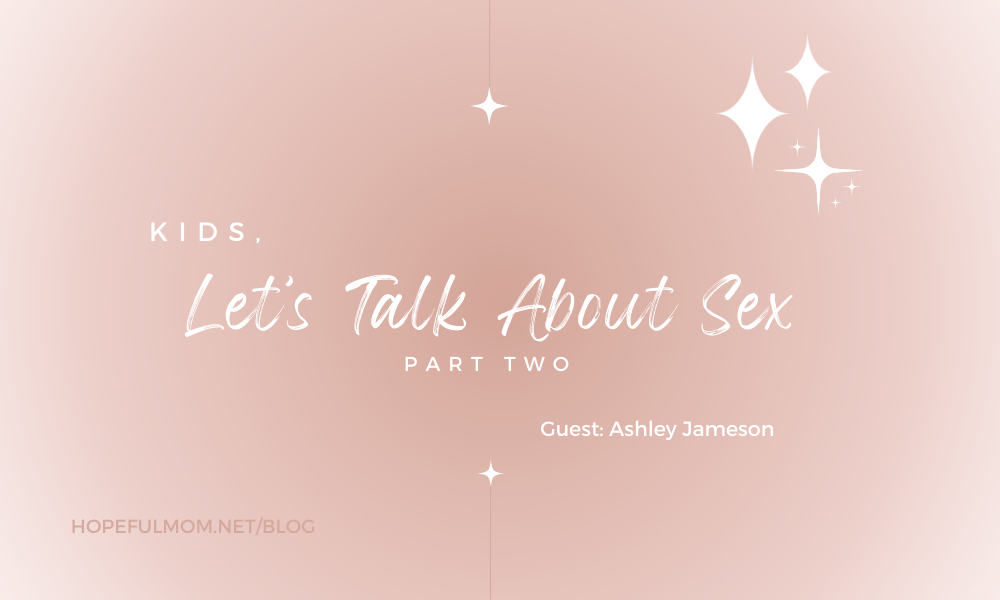Ashley Jameson of Pure Desire Ministries continues her discussion with us. Thanks, Ashley, for helping us talk about the brain, the body, and healthy boundaries.
Last time we talked about creating a culture of grace in our homes through being vulnerable and sharing our stories with our kids. It’s not always easy to create an environment where our kids know it’s safe to talk with us about anything! We so badly want our kids not to struggle. Here are a few things that helped me change the atmosphere in my house which allowed my kids to feel safer to come to me with their questions.
Make Brain and Body Talk Normal
If you are not up to speed on the brain and body happenings of a boy, or girl, this may require a little research. This is important: explain what’s going on with their body so they don’t assume there is something wrong when they experience change.
I certainly needed to read several books on the teenage brain in order to explain what was happening with my Hulk-ish son. I learned that his heightened aggression could be due to the massive increase of testosterone in his brain. When I was able to talk to him about the biology of his body, it helped him understand why he had been so short-fused lately. He didn’t want to suffer the consequences of how he treated those around him. Once he understood that his hormones were in high-gear, he gave himself and everyone else a little grace and things quieted down.
Knowledge is power.
With having two teenage boys, my husband has been a great resource for them. He has first-hand experience with the brain and body changes that boys experience. As weird as our kids might think it is, my husband’s honest vulnerability always opens the door for the boys to share what changes they’re going through. It normalizes their sexuality. It gives them the opportunity to ask personal questions and get honest answers.
Sometimes the conversation gets too honest. There are disgusting, teenage boy things that you just can’t unhear, even if you wanted to, and I’m sorry about that. It’s par for the course.
But, building relationship through open conversation and answering questions in a straight way is a great strategy to use. It minimizes the shame and discomfort your kids might feel when opening up about their sexuality. This is extremely important, not just for teens, but for younger kids too.
My six-year-old son once asked, “Why is my penis so big every time I wake up?” I simply responded that it’s probably because he needs to go to the bathroom and that’s why it goes back down after he’s done. I also told him that God made him that way and everything is working just the way it should. End of story, he was off to use the bathroom.
The Value of Healthy Boundaries
We all have vulnerabilities. When we recognize our vulnerabilities, it’s easier to accept the need for healthy boundaries. It is important for my kids to know that establishing healthy boundaries is not an issue of trust—whether we trust them or not. It’s about protecting their brain from exposure to something that could potentially cause them harm.
For example: when on the Internet, if they stumble across something that is intriguing, sparks their curiosity, or even makes them feel good, and they linger on the site for a while, this doesn’t make them a bad person. They need to understand, they have a choice to make: they can quickly leave the site before the behavior becomes something they can’t control and they might have mixed feelings about that experience.
I tell my kids, it’s my job to provide a supplemental brain for them while their brain is still developing. Their brain won’t fully develop until their mid-twenties, so in the meantime, my brain will help them process their behaviors and protect them from harmful things. I would like them to learn to manage their behaviors and temptations—through establishing healthy boundaries—by the time they leave my home.
It is important for my husband and me to be honest about our temptations and weaknesses, and to model healthy boundaries. Our kids need to know that having healthy boundaries is not just an issue for kids. Establishing healthy boundaries, having safeguards in place, is an issue for all of us. I often remind my kids, healthy people are not perfect people. Healthy people are aware of their weaknesses and have a plan to maintain health, even if they mess up.
"I often remind my kids, healthy people are not perfect people. Healthy people are aware of their weaknesses and have a plan to maintain health, even if they mess up." Ashley Jameson Read more here: Kids, Let's Talk About Sex, Part 2 Click To TweetKids need to know that there is no such thing as a perfect person. Jesus was the only one. Real living is what my kids need to see, not a Pinterest-perfect Christian highlight reel.
Kids Need to Know
Kids can smell fake from a mile away. If I have areas in my life that I haven’t dealt with, or are spinning out of control, they will know. They might not know the source or struggle exactly, but they will know that something is off.

Working through my past trauma and addictive behaviors was the best parenting choice I’ve ever made. My recovery work continues to be the best parenting and marriage resource I have. Working on myself allowed me to apply the information and then organically pass it along to my kids as the opportunity presents itself.
When I maintain an open and honest relationship with my kids, it allows me to help them understand what’s going on throughout their development.
Here are four continuous conversations that I have with my kids:
- What is happening to their bodies physically
- How misuse could impact them emotionally, spiritually, and physically
- How God designed them and who they are in Christ
- What my role is as their parent and how much I love them, no matter what
In order to speak into these four areas, I need to make sure that I’m constantly educating and growing myself. Growing in my relationship with God and reading books about what my kids are going through are key for me. I need to make sure that my soul, body, and brain are healthy, so I can pass these things on to my kids.
As a parent, your next step may be to figure out how you can work on your own health and change your family tree. The best thing you can do to teach your kids about emotional, sexual, and physical health is to model it yourself, then teach it organically. It’s worth it!
Lifelong change starts with us.
Kids, Let’s Talk About Sex Part 1 and Part 2 are reprints. You can find the original at Pure Desire Ministries here.
Connect with Hopeful Mom through FB and IG, and subscribe to our email list below.
About the author

Ashley Jameson
Ashley is the Associate Director of Women's Groups for Pure Desire. She is a certified Pastoral Sex Addiction Professional (PSAP) through the International Institute for Trauma and Addiction Professionals (IITAP) and has been trained in the Multidimensional Partner Trauma Model (MPTM) through The Association of Partners of Sex Addicts Trauma Specialists (APSATS). She helps churches around the world develop sexual integrity groups. Ashley oversees all women Regional Group Advisors (RGAs) and is involved in training men and women to facilitate recovery and support groups. She is a speaker and a contributing author to Unraveled: Managing Love, Sex, and Relationships.


